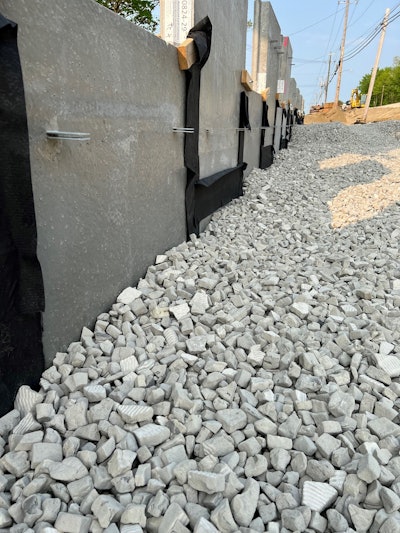
Editor's Note: This article was updated June 23, 2023, to reflect that I-95 has reopened.
Rebuilding the collapsed section of I-95 in Philadelphia involved using a backfill material made almost entirely of recycled glass.
The material, called ultra-lightweight foamed glass aggregate or UL-FGA, began arriving June 15 from Aero Aggregates, based in Eddystone, Pennsylvania. About 15,000 cubic yards of the aggregate was placed in the gap created by the demolished overpass, according to state Transportation Secretary Mike Carroll.
The aggregate forms the basis for a temporary paved road with three lanes north and three lanes south, which reopened June 23. (For more on the reopening, click here.) Work now turns to building a permanent overpass. The lanes for the permanent bridge will be built to both sides of the temporary structure. When completed, traffic will be diverted from the temporary structure. Construction will then begin on building the rest of the permanent overpass after the aggregate is removed. Carroll said the excavated backfill will be used on another project.
AeroAggregates says its UL-FGA is 85% lighter than quarried aggregate and is a “highly frictional surface, which makes it ideal as a lightweight backfill.” The company also says it is nonflammable, nonleaching and rot resistant. Because of its light weight, it can be used over load-sensitive infrastructure such as culverts and tunnels underneath a road.
This will not be the first time the glass aggregate has been used in Pennsylvania. On its Twitter feed, the company points to its product being used in December to support a flyover ramp to I-95 southbound. Buckley & Company was the contractor on the project and is also the same one hired to rebuild the collapsed section of I-95.
The product has been used in various road projects around the country, including on the I-485 Express Lanes near Charlotte, North Carolina. It was used as backfill in an area where a concrete box culvert would have been unable to handle the pressure of a proposed bridge abutment, the company says.
The product was developed in Germany in the 1980s and was used in the 1990s for road construction in Norway to prevent frost heave. AeroAggregates was founded in 2015 in the U.S. “Today, foamed glass aggregates are used as lightweight fill for highways, bridge abutments, retaining walls, foundations, and green roofs, and can also be used as aggregate in lightweight concrete,” the company’s website says.
The process to create the aggregate involves taking commercial glass bottles recycled at curbside, crushing them to powder and mixing in a foaming agent. The mixture is heated to temperatures up to 1,800 degrees Fahrenheit in a kiln. “The foaming agent creates bubbles within the softened glass, and this creates foamed glass aggregates,” according to the website. Up to 100 cubic yards of the material can be hauled per truckload. That means about 150 truckloads were needed for the I-95 collapse site.
The company says it recycles the equivalent of 140 million glass bottles each year at its plant in Eddystone and is the “first vertically integrated, U.S.-based company to produce lightweight aggregates from 100% recycled glass.”
To watch a live feed from the collapsed I-95 rebuilding site, go to PennDOT's YouTube page.
 A rendering of the six temporary lanes to reopen I-95 in Philadelphia with permanent lanes being built on the outside.Pennsylvania Department of Transportation
A rendering of the six temporary lanes to reopen I-95 in Philadelphia with permanent lanes being built on the outside.Pennsylvania Department of Transportation









